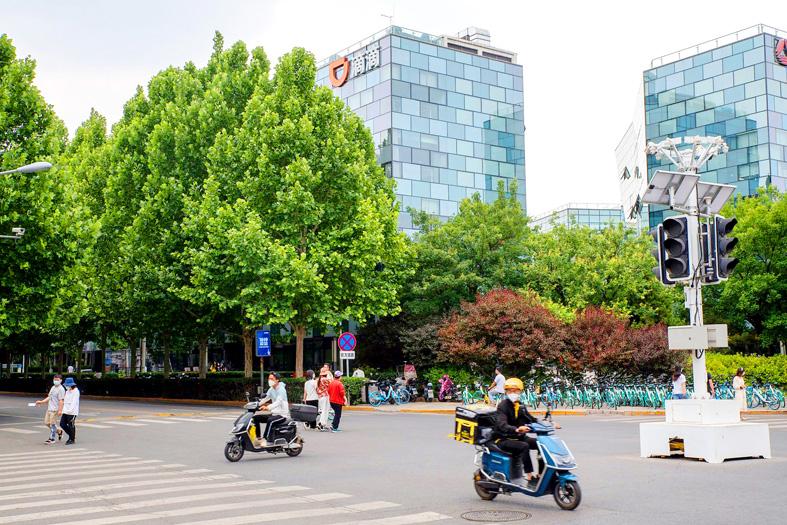China is preparing to fine ride-hailing giant Didi Global Inc (滴滴) more than US$1 billion to wrap up a long-running probe, media reports have said, boosting investors’ hopes that the country’s tech crackdown is winding down.
Didi, once known as China’s answer to Uber Technologies Inc, has been one of the highest-profile targets of the widespread clampdown on the sector, which saw years of runaway growth and supersized monopolies before regulators stepped in.
The fine — imposed over Didi’s cybersecurity practices — would amount to more than 4 percent of its US$27.3 billion revenue last year and pave the way for its new share listing in Hong Kong, the Wall Street Journal reported on Tuesday.

Photo:Bloomberg
Citing unnamed sources familiar with the matter, the newspaper said that once the fine is announced, the Chinese government would ease its restrictions on Didi’s operations.
The firm was prevented from adding new users, and regulators ordered its apps removed from online stores in China.
The Wall Street Journal report triggered a rally in Chinese tech shares in Hong Kong yesterday, with investors hopeful that the two-year regulatory storm that swept the sector was nearing its end.
E-commerce giant Alibaba Group Holding Ltd (阿里巴巴) soared 4 percent, while gaming titan Tencent Holdings Ltd (騰訊) gained 2.5 percent in early trade.
If confirmed, Didi’s fine would be the largest imposed on a Chinese tech company since Alibaba was told to pay US$2.75 billion in April last year over anticompetitive practices.
Didi did not respond immediately to an e-mailed request for comment.
China’s regulatory crackdown this year eased, as the country grapples with the economic fallout from its “zero COVID-19” strategy, with China struggling to reach its 5.5 percent growth target.
However, there is still a strict regulatory environment for tech firms.
Chinese President Xi Jinping (習近平) last month called for stronger oversight and better security in the financial tech arena.

Hon Hai Precision Industry Co (鴻海精密) yesterday said that its research institute has launched its first advanced artificial intelligence (AI) large language model (LLM) using traditional Chinese, with technology assistance from Nvidia Corp. Hon Hai, also known as Foxconn Technology Group (富士康科技集團), said the LLM, FoxBrain, is expected to improve its data analysis capabilities for smart manufacturing, and electric vehicle and smart city development. An LLM is a type of AI trained on vast amounts of text data and uses deep learning techniques, particularly neural networks, to process and generate language. They are essential for building and improving AI-powered servers. Nvidia provided assistance

DOMESTIC SUPPLY: The probe comes as Donald Trump has called for the repeal of the US$52.7 billion CHIPS and Science Act, which the US Congress passed in 2022 The Office of the US Trade Representative is to hold a hearing tomorrow into older Chinese-made “legacy” semiconductors that could heap more US tariffs on chips from China that power everyday goods from cars to washing machines to telecoms equipment. The probe, which began during former US president Joe Biden’s tenure in December last year, aims to protect US and other semiconductor producers from China’s massive state-driven buildup of domestic chip supply. A 50 percent US tariff on Chinese semiconductors began on Jan. 1. Legacy chips use older manufacturing processes introduced more than a decade ago and are often far simpler than

STILL HOPEFUL: Delayed payment of NT$5.35 billion from an Indian server client sent its earnings plunging last year, but the firm expects a gradual pickup ahead Asustek Computer Inc (華碩), the world’s No. 5 PC vendor, yesterday reported an 87 percent slump in net profit for last year, dragged by a massive overdue payment from an Indian cloud service provider. The Indian customer has delayed payment totaling NT$5.35 billion (US$162.7 million), Asustek chief financial officer Nick Wu (吳長榮) told an online earnings conference. Asustek shipped servers to India between April and June last year. The customer told Asustek that it is launching multiple fundraising projects and expected to repay the debt in the short term, Wu said. The Indian customer accounted for less than 10 percent to Asustek’s

Gasoline and diesel prices this week are to decrease NT$0.5 and NT$1 per liter respectively as international crude prices continued to fall last week, CPC Corp, Taiwan (CPC, 台灣中油) and Formosa Petrochemical Corp (台塑石化) said yesterday. Effective today, gasoline prices at CPC and Formosa stations are to decrease to NT$29.2, NT$30.7 and NT$32.7 per liter for 92, 95 and 98-octane unleaded gasoline respectively, while premium diesel is to cost NT$27.9 per liter at CPC stations and NT$27.7 at Formosa pumps, the companies said in separate statements. Global crude oil prices dropped last week after the eight OPEC+ members said they would